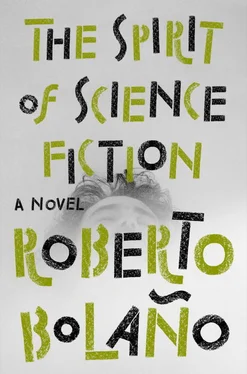Much love and thanks, Jan Schrella
“Seriously, now, let’s talk about your book—your monumental work.”
“My work, as you call it, begins on the third floor of the Potato Academy, in old Santa Bárbara, in the foothills of the Andes. It’s the story of Boris, son of Juan Gonzales and student aide at the Unknown University. An ordinary kid.”
“Wait. There’s some interruption. Do you hear a strange noise?”
“It must be those alcoholics yelling. Who would’ve thought renowned intellectuals and men of letters (God shit on them) could make such a racket? Even the ones who’ve fallen asleep are snoring like bears.”
“They’re celebrating your triumph, my young friend.”
“Look at that old man: he’s got his face in his wife’s crotch.”
“That’s not his wife. Never mind. All his life he’s fought for the perfect word and silence. Otherness. Now he’s scared but happy. The reason for his happiness is you. You and your magnificent poems.”
“I get the sense that the only sober person in this Republic of Letters bacchanal is me. You, dear reporter, have had a touch too much vodka. It’s clear that I’m not here for my ‘magnificent’ poems.”
“Anyway, back to your work. How is the girl? Is she still sick?”
“No. Now there’s a fiesta in town, and the girl walks the streets with a crown of flowers in her hair. The people gather in the Plaza de Armas, and then they stream along the streets of town. They’re singing as they go. There aren’t many of them, as I’ve said. The town isn’t big, and the song that they sing has no words: it’s a string of aa-ohh, aa-ohh, ee-ahh, ee-ahh sounds, a little like an Indian lament.”
“At a certain point, they pass in front of the Potato Academy.”
“Yes. The caretaker is watching from the window. The procession continues to the end of Calle Galvarino, turns onto Valdivia, and is gone. Only the girl is left standing in the middle of the street, and this time the caretaker notices her. The sky, of course, suddenly grows dark.”
“Does the girl think it’s a haunted house?”
“No. She’s still too little for that. In fact, she hesitates for a second and goes into the academy. From the window, the caretaker sees her shadow flit across the yard, and then he hears her light step on the stairs. The old man softens. Ah, he thinks, ah . The bride. The betrothed. The eyes that could look upon Boris with love. The immaculate child on her way up the stairs, believing herself unseen. Then, of course, he goes back to his cables and reels. He has time; the broadcast isn’t for a while yet. The electric bill for the grain shed at 800 Galvarino is the highest in Santa Bárbara. If he gets raided someday, that might be why. I think it was Dan Mitrione who, back in the day, taught the cops how to hunt leftists by reading the electric meter. Any house that uses too much or too little electricity is suspicious. The crowd, meanwhile, returns to the plaza after making a loop around town, and now they begin to disperse. Silence descends on the streets once again. A silence for which the caretaker is grateful: he can handle interruptions and curious girls, but not this revelry and celebration, painful because they remind him of his sad life devoted to his work. But let’s not exaggerate. The caretaker gets intoxicated and dances, too, in his own way. His holidays are pure potential. He doesn’t know what boredom is. The recipe for spicy potato cake is his exclusive property. Nothing to sniff at, wouldn’t you agree?”
“It must be a sad life—yours, I mean, my young friend.”
“Sure: I’ve squandered my adolescence in seedy movie theaters and pestilent libraries. To make matters worse, my girlfriends always leave me.”
“Now everything might change. A bright future lies ahead of you.”
“Do you say that because of the prize?”
“Because of everything that the prize entails.”
“You poor, naïve reporter. First you mistake this room in the middle of some random forest for a crystal palace on a hill. Then you actually predict a bright future for art. You don’t realize yet that this is a trap. Who the hell do you think I am, Sid Vicious?”
Everything that happened at Angélica Torrente’s house, as I remember it, fades into the background, as a prelude to the loud ring of the bell. Someone’s at the door, and everyone’s in Lola Torrente’s room, and I go to answer it, the door: coming!
But there are things that I remember vividly—books, records (the shiny black objects themselves, I mean, not the music), and, especially, Lola Torrente, two years older than Angélica, much darker, bigger-boned, not thin at all. To me, her smile is still the terminal smile of that other Mexico, a place sometimes revealed between the folds of a random dawn: part rabid will to live, part sacrifice stone. It’s not too much to say that for an hour I had been in love with Angélica. Or that around midnight, more or less, my love gradually faded until it perished entirely, amid glasses of alcohol and cigarettes and don’t touch Mallarmé, assholes, you’ll fuck it up. It’s possible that the rapid rise and fall of this great platonic love had something to do with Lola Torrente. I don’t mean—this would be the height of fickleness—that during the course of the party I transferred my affections from one sister to the other, but rather that first (let’s be honest), Angélica wouldn’t give me the time of day, and second, as the only person there who didn’t know everyone, I was limited to the role of observer (though unfortunately I did open my mouth, too), and at some point that was how I discovered that there was a structure of mirrors between the two sisters, mirrors in which each of them was distorted and reflected back at the other like a message, so that one sister might receive a still and harmless figure and the other a little glass ball under the bed, though most of the time they were firing deadly laser beams back and forth. The star of the party and of everything was Angélica. The powerful shadow was Lola. And it was this and the certainty with which Angélica handled the situation (but especially, as I’ve said, her manifest indifference to me) that left me on the sidelines, relegated to the joys of the observer. Anyway, Angélica wasn’t lacking in suitors; neither, I must admit, was Lola, though her suitors (actually just one suitor, but a nice one) were nothing like the promises made flesh who courted her sister. The issue, according to Pepe Colina, a Nicaraguan versed in Horace and Virgil, was that Angélica was a virgin and Lola wasn’t, and at least one or two hundred people knew it. I glared at him—some things are simply in bad taste—and then I asked him how two hundred people could be aware of such an intimate detail. From people like me, of course, he replied. I guessed, not without blushing, that Pepe Colina had slept with Lola Torrente. An odd couple, I thought, in the tradition of the short, glasses-wearing guy and the strong, independent woman. I lit a Delicado, feigning indifference. I felt myself getting an erection. I retreated to the bathroom and finished smoking the cigarette. At a certain point, I looked at myself in the mirror and started to laugh very softly. On my way out, I almost ran into Lola Torrente. She was a little bit drunk. Her eyes were dark and bright. She whispered something unintelligible, smiling, and closed the door. I knew that our friendship had been sealed.
I went back to the living room, literally bouncing with joy. What was José Arco doing meanwhile? Surrounded by the shyest, least graceful, and worst dancers, my friend was telling stories: the new Peruvian poetry, the Hora Zero group, Martín Adán’s silver knife, Oquendo de Amat, and other stories, too, new to young Mexican poets back then, stories as true and horrifying as life itself, in which his Honda scaled the highways and trails of western Mexico until it reached an eagle’s crag of toughness, what Baldomero Lillo called the very center of the hot potato, whereupon he launched himself at 120 or 130 kilometers an hour along the twisting path of the story.
Читать дальше












